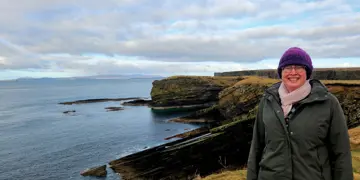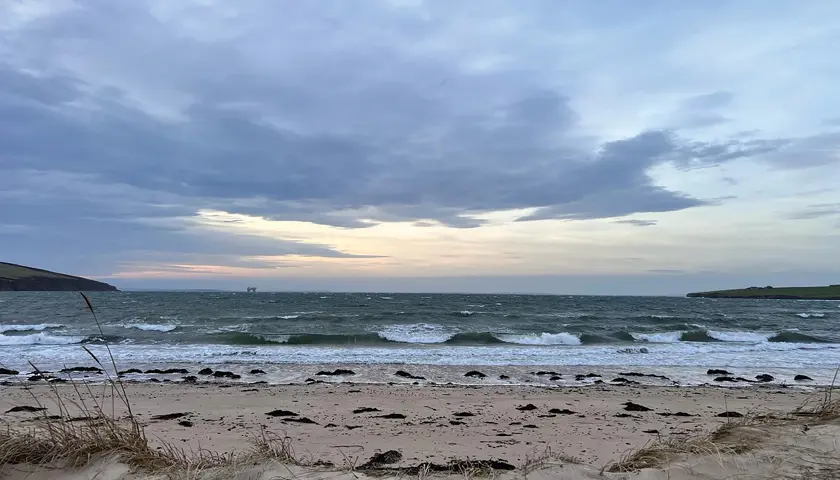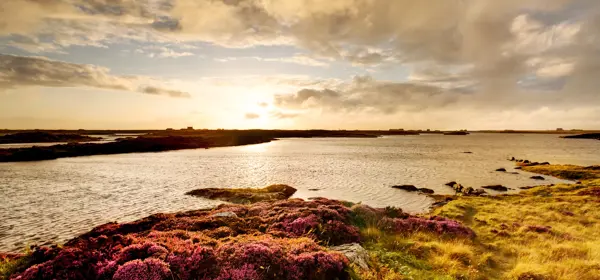Out on a limb
Out on a limb
From the Falklands to the Western Isles, island-hopping doctor Rebecca Payne has provided out-of-hours care in many beautiful and isolated places. Peter Blackburn follows her to Orkney to find out about life as a travelling GP
‘Trio face attempted murder charges,’ reads the front page of The Orcadian newspaper on the day The Doctor lands in Kirkwall, the largest town in Orkney.
GP Rebecca Payne – part way through a week-long shift working out of hours on the islands – carried out the fitness-to-detain medicals for the three suspects amid an otherwise relatively quiet night.
It is a story that says it all about working as an island GP – general practice is often at the heart of communities but in isolated and rural areas such as Orkney doctors often find themselves thrust into the thickest of the action. Each shift could mean being a social worker, providing emergency care, or being an ambulance driver among a whole host of other potential roles and responsibilities. One might even be at the centre of the biggest news story on the islands.
‘I love being a generalist,’ Dr Payne tells The Doctor as she takes us on a tour from Kirkwall to Burwick – at the very south of the islands. ‘Here, you see so much and you have such a privileged insight into people’s lives at incredibly important times.’
Dr Payne, who is on a rota with seven other doctors who each spend one week in eight in Orkney, adds: ‘I really enjoy doing a little bit of everything using skills you wouldn’t normally use. The idea of being in a surgery doing chronic disease management all day would drive me potty. And I love islands and I’m really attracted to the coast. It’s magical here – the light is amazing.’
Home alone
Working on the main islands of Orkney, which are connected by the iconic Churchill barriers – built largely by Italian prisoners of war during the Second World War and intended to block off Eastern approaches to the naval anchorage of Scapa Flow but now serving as causeways connecting the mainland with smaller islands to the south – is not always so different to life as a GP in much of the UK. There is a modern, well-equipped hospital, lots of local amenities and relatively good transport links and community services.
However, the separation from the mainland and hospitals with specialist staff and facilities, and the simple difficulties of geography and rural life, do raise challenges. From bad phone signal across the islands to having three patients requiring help at the same time in far-flung locations, there are many concerns most doctors will never have to face.
It is, though, on the most remote island settings where the challenges are most particular and pressing.
I really enjoy doing a little bit of everything using skills you wouldn’t normally use
Dr Payne
‘On some islands you are essentially alone. You might have a part-time receptionist or no receptionist at all with you. You might have to do everything from first response to ambulance calls, taking bloods to the plane and collecting medications from the ferry – it’s the antithesis of working to the top of your licence but it is so much fun. I really like some of those aspects and the challenge and privilege of sometimes just being really on your own.’
She adds: ‘It’s just whatever comes on that day. You might see a child with a croup or it might be a major heart attack.’
There are two out-of-hours cars on the Orkney mainland. Each is packed meticulously with all the equipment and tools that might be required – everything from basic dressings to intubation equipment. One of the bags even contains a drill for boring through bone. Dr Payne says the first time she was stranded alone on an island with these bags she wondered ‘what on earth am I doing’ but then the training, provided by BASICS, kicks in and the sense of opportunity to play an important role in an amazing place takes over.
Freak waves
Geography and transport obviously become even more challenging on the smaller islands, too. On one occasion Dr Payne was left stranded on one of the Orkney islands during New Year owing to stormy weather, and even the islands connected to the mainland can become isolated when waves crash over the barriers and they have to close.
‘There’s a story of a locum GP down on South Ronaldsay who was driving over the barriers and a wave wedged her car down into the side of the road and she couldn’t get out. A police car came to rescue her and also got stuck.’
On one occasion, Dr Payne had a call to go and see a patient on one of the islands connected by the barriers just an hour and a half before local authorities were due to assess their safety – and likely shut them. ‘It was utterly terrifying and the tide was rising so I knew it was only going to be worse coming back. I drove over barrier one which was scary but barriers two and three were particularly terrifying.’ Luckily, another doctor on the island saved the day and was able to see the patient – preventing Dr Payne from making the particularly scary final crossing.
When The Doctor visits, all is calm, though. On a sunny day like this the water here looks almost tropical and the islands gleam in brilliant light. It isn’t remotely hard to see the attraction.
Dr Payne, who is based in Wales and works in academia when she is not on Orkney or the other islands she locums on, has been covering out-of-hours shifts on the islands for four years now, having signed up just before the onset of the COVID-19 pandemic. At the height of the Omicron variant surge there were fears that just one out-of-hours doctor might be swamped with 200 patients a day over a bank holiday weekend.
‘Feast or famine’
There have been many memorable moments since, including a middle-of-the-night dash to manage a man’s heart attack until help arrived – and ending up continuing his care in the back of the ambulance for the 40-minute drive to hospital because only one paramedic was available.
‘It can be a real feast or famine thing. You can be waiting to be needed then suddenly doing quite high-stakes stuff,’ Dr Payne says.
While shadowing Dr Payne – based in a small treatment room within the emergency department at Kirkwall’s Balfour hospital – we meet a fellow in rural medicine working with her who had recently found herself organising the dramatic rescue of a patient who had suffered a major stroke while one of the smaller Orkney islands was covered in snow – with farmers pulling together to help the man. The uniqueness and variety of a role in a place like this is highlighted when a man who works on an oil rig presents with an infected finger, having been treating it at home for days using a poultice of bread.
For many people islands such as Orkney represent escapism – and perhaps there is an element of that for Dr Payne. This is a doctor whose love for people and her caring craft burst out when she speaks. But in many parts of the NHS of 2024 those values can often feel compromised.
‘I’ve done some really difficult, hard jobs in the past. Working in under-resourced surgeries, being a clinical director where you feel you can make little to no change due to wider context and the way services are run and now I get to do this. I have to pinch myself sometimes.’
‘So cool’
Dr Payne says she sometimes feels ‘guilty’ about running away to work on the islands when there is so much need elsewhere, but after a few days in Orkney and in her company it seems she would be sorely missed here, too.
Islands have become something of an obsession for Dr Payne. Alongside her regular work in Orkney she also covers shifts on Barra in the Outer Hebrides where the aircraft lands directly on the beach – ‘It is so cool – exhilarating’, she says – and has worked on the Uists.
Last summer, Dr Payne fulfilled a long-term fantasy and spent a month in the Falkland Islands – working in a hospital, emergency departments and out-of-hours GP services.
On some islands you are essentially alone. You might have a part-time receptionist
Dr Payne
Doctors covering shifts in the Falklands are flown from Brize Norton in Oxfordshire in an RAF aircraft. Dr Payne’s time on the islands included all sorts of healthcare from hospital work to working as a flying doctor, hopping between remote islands next to the pilot on a tiny plane. And when not at work it was a ‘totally unforgettable’ experience too – with off-road 4x4 journeys and trips to see ‘majestic’ colonies of penguins on the beach, some just 10 minutes from the hospital.
After days spent with Dr Payne, the sense is that island escapism may be a pleasure but it is also absolutely business for her above anything else – and perhaps a rediscovery of the intimacy of working in general practice in communities which really value it.
Dr Payne says: ‘The greatest privilege about working here is you can be the doctor that you want to be and come home feeling like you’ve given amazing care. That’s the greatest privilege – not the landscape.’




![PHOTO 2024 05 24 12 31 51[3]](/media/0j0amzld/photo-2024-05-24-12-31-51-3.jpg?width=600&height=600&format=webp&v=1dac882fa1a1d10)
